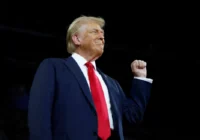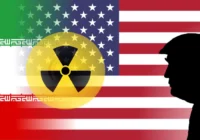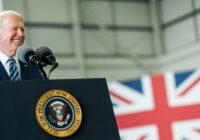As Donald Trump assumes the presidency for a second term, the US is undergoing significant shifts in domestic policy and geopolitical strategy. These crucial changes herald a much-needed recalibration of the US’s realpolitik, especially concerning India–US relations, which some considered to be devoid of realism during the Biden administration.
The Biden years To Trump 2.0: resetting the White House
A mix of socio-economic failures and the decline in the US’s geopolitical influence created the conditions for a reset in the White House.
Following Trump’s dramatic exit from power in 2021, the Joe Biden administration embraced a “measured” and retrained strategic response toward global politics. This put pressure on the US’s position of global influence because of the emerging high-power rivalries the US has with China and Russia. Biden’s foreign policy may have contributed to the emergence of a strong alliance against the US between Pakistan, Russia, Iran, China and North Korea (PRICK).
One of Biden’s greatest international failures was the Build Back Better World (B3W) plan. The 2021 plan was an international economic development initiative by the G7 countries to counter China’s Belt and Road initiative and stabilize regional economies after COVID-19. However, the plan failed to gain traction and was rebranded as the Partnership for Global Infrastructure and Investment with much less ambitious goals.
On the domestic front, the Biden White House made other miscalculations. One of these missteps was the economic failure of Biden’s big policies, such as the American Rescue Plan, which led to massive inflation. Biden’s energy policies were another blunder, experiencing setbacks since the start of the Russia-Ukraine war. Canceling the Keystone XL pipeline put additional pressure on the US energy sector.
Another domestic failure was an increase in the crime rate. According to Fox News, “Violent crimes have dramatically increased during the Biden-Harris administration, according to a recent Department of Justice study that appears to refute consistent claims by the Harris campaign.” Other issues, such as immigration and rejecting identity politics also influenced voters.
The US’s realpolitik
The US’s realpolitik has two key features: influence and competition with emerging powers. During the Cold War, the US deep state used every available strategy to counter the Soviet Union’s increasing influence. However, one major player in the US realpolitik significantly influenced the US’s approach to global events, sometimes even challenging branches of the deep state.
Two significant presidents during the Cold War were John F. Kennedy and Gerald Ford. To some extent, both had a “measured, strategic response” rather than an assertive, strategic response, which came in the 1980s with President Ronald Reagan. Kennedy’s hesitation in using the CIA as a significant tool for US foreign policy goals, instead slashing its budget, created difficulties in steering US foreign policy during the initial phases of the Cold War.
Similarly, the Soviet–US détente supported by President Ford was criticized by analysts and Ford’s Secretary of Defence, James Schlesinger. The Détente was a strategic failure, with the Soviet Union invading Afghanistan in 1979. A major setback came when Ford ordered the immediate evacuation of US personnel from South Vietnam in 1975, causing a crisis similar to the disastrous US withdrawal from Afghanistan in 2021. The CIA faced embarrassment during Ford’s presidency when an investigative journalist exposed the CIA’s Operation CHAOS, which engaged in domestic surveillance of US citizens, in violation of the National Security Act of 1947.
Following the Cold War, President Bill Clinton attempted to adjust the US’s foreign policy strategy back to a “measured response.” Clinton’s main focus was on domestic policy and trade. His foreign policy has been described by analysts as the Doctrine of Enlargement, which favored the promotion of free markets and democratic principles in other countries. To some extent, this policy was responsible for the failure to restore democracy in Somalia, which resulted in the resignation of Clinton’s Secretary of Defence after the failed Operation Gothic Serpent. The Clinton administration also failed in 1993 when it was unable to oust Haiti’s military dictator, Raoul Cedres, and in 1994 when it did not intervene in Rwanda to prevent genocide.
These failures share many similarities with those of the Biden presidency. Biden re-negotiated the nuclear deal with Iran, withdrew from Afghanistan and made other miscalculations in Europe and the Middle East. Similar to Biden’s predecessors, who embraced a similar foreign policy, these errors caused significant setbacks to the US’s geopolitical position.
Now that Trump will be back in the White House, the US’s foreign policy will be better suited to navigate the ever more complex world order. Trump’s second term promises an assertive response to global and regional crises, making it worth observing how wars in the Middle East and Europe unfold after he assumes office.
Trump’s second term may ease pressure on the trans-Atlantic security architecture and provide more freedom for European countries to make their own security and defense decisions. This new policy contrasts the Biden years, when the US was too involved in European security decisions, leading to friction with European countries, especially France.
Some have argued that US realpolitik is hampered by Ukraine. However, if the US engages in an “assertive, strategic response” to re-building confidence among European nations and shore up European security architecture, the US may be able to check Russian influence.
During Trump’s first term, his “assertive, strategic response” effectively addressed evolving geopolitical dynamics, keeping China under the radar and Russia in check without straining relations with the US. Similar adjustments are expected in Trump’s second administration, but with a key difference in the Middle East. The space for Iran, which expanded under the Biden administration, is likely to shrink rapidly under Trump. This shift will allow the US to adopt a more assertive stance toward Iran while rebuilding strategic relations with Saudi Arabia and the UAE.
It is unlikely that Donald Trump will eliminate the so-called deep state, which consists of officials embedded within the executive branch of the US government who espouse an ideology that may be contrary to the administration’s. Instead of being completely eliminated, the deep state could be reduced in size, as it plays a significant role in the US’s realpolitik, particularly for any incoming Trump administration. During Trump’s first term, the deep state functioned in a limited yet operational manner. For instance, Trump appointed Gina Haspel, the first woman to serve as deputy director of the CIA and later as CIA director in 2018, despite strong reservations from some senators. These examples suggest that the deep state under a Trump administration could continue to function effectively with minor adjustments.
India–US relations: and upward trajectory
The India–US relationship is currently on an “upward trajectory,” with the Comprehensive Global and Strategic Partnership between the two countries recently reaffirmed. The partnership will receive more traction in the Trump Administration. During Trump’s first term, the US understood India’s interests much better than the Biden administration, with few exceptions. The Trump administration’s superior understanding of India will help build much-needed trust between the two nations, whose relations have been strained by US criticism of India’s internal affairs. However, trade between India and the US will not change much during Trump’s second term, given the implications of his America first policy for trade and high tariffs.
When Trump enters office, he has to re-adjust the US’s realpolitik to revive the US’s declining influence on the global stage. The move from a measured to an assertive approach will only come after the realization that restrained and measured approaches lead to significant policy and strategic failures for the US. Biden’s foreign policy failures are the most recent example of this.
[Joey T. McFadden edited this piece.]
The views expressed in this article are the author’s own and do not necessarily reflect Fair Observer’s editorial policy.
Support Fair Observer
We rely on your support for our independence, diversity and quality.
For more than 10 years, Fair Observer has been free, fair and independent. No billionaire owns us, no advertisers control us. We are a reader-supported nonprofit. Unlike many other publications, we keep our content free for readers regardless of where they live or whether they can afford to pay. We have no paywalls and no ads.
In the post-truth era of fake news, echo chambers and filter bubbles, we publish a plurality of perspectives from around the world. Anyone can publish with us, but everyone goes through a rigorous editorial process. So, you get fact-checked, well-reasoned content instead of noise.
We publish 2,500+ voices from 90+ countries. We also conduct education and training programs
on subjects ranging from digital media and journalism to writing and critical thinking. This
doesn’t come cheap. Servers, editors, trainers and web developers cost
money.
Please consider supporting us on a regular basis as a recurring donor or a
sustaining member.
Will you support FO’s journalism?
We rely on your support for our independence, diversity and quality.








Comment